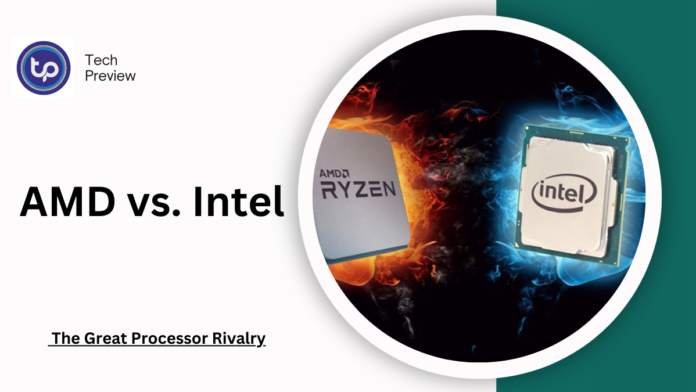In the realm of computer processors, two names dominate the conversation: AMD and Intel.
These tech titans have long been locked in competition, each striving to provide superior performance, efficiency, and groundbreaking technology.
This rivalry has reshaped the CPU market, offering consumers a broad selection of robust and budget-friendly options.
A Quick Historical Overview
Origins
The competition kicked off in the late 1960s when AMD was founded to produce Intel’s chips.
The rivalry intensified during the 1990s when AMD unveiled its own x86 processors, directly challenging Intel’s established market position.
Market Shifts
Over the years, both companies have alternated in leading the market.
Intel was the go-to choice in the early 2000s, but the launch of AMD’s Ryzen processors in 2017 marked a turning point, compelling Intel to accelerate its innovation efforts.
AMD vs. Intel: Which Brand is Superior in 2024?
With a plethora of choices available, many are keen to know which brand stands out in 2024.
ALSO READ : Intel Stock Review: Navigating Challenges and Future Prospects
This article aims to clarify the primary differences to assist you in selecting the ideal processor for gaming, content creation, or daily use.
Key Highlights
- Market Dominance: AMD and Intel are the leading players in the CPU sector.
- Performance Leadership: Intel is often recognized for its outstanding performance metrics.
- Energy Efficiency: AMD is praised for its power-saving designs and excellent gaming capabilities.
- Diverse Offerings: Both brands present a wide range of processors tailored to different budgets and user needs.
Processor Breakdown: AMD vs. Intel
Recognizing the distinctions between AMD and Intel processors is crucial for making an informed decision. Below is a comparison of their premium and budget-friendly options.
MUST READ : Does AMD FreeSync work with NVIDIA graphics cards?
High-End Processors: AMD Ryzen 9 vs. Intel Core i9
For high-performance tasks such as gaming and content creation, the AMD Ryzen 9 and Intel Core i9 are leading choices.
| Specification | AMD Ryzen 9 5950X | Intel Core i9-12900K |
| Cores/Threads | 16/32 | 16 (8 Performance + 8 Efficiency)/24 |
| Base Clock Speed | 3.4 GHz | 3.2 GHz |
| Boost Clock Speed | 4.9 GHz | 5.2 GHz |
| Cache Size | 72 MB | 44 MB |
| Thermal Design Power (TDP) | 105W | 125W |
AMD’s Ryzen line is becoming popular for its exceptional performance in multitasking and gaming scenarios.
Mid-Range Options: AMD Ryzen 7 vs. Intel Core i7
Both the AMD Ryzen 7 and Intel Core i7 are strong candidates for gamers and professionals.
| Specification | AMD Ryzen 7 5800X | Intel Core i7-12700K |
| Cores/Threads | 8/16 | 12 (8 Performance + 4 Efficiency)/20 |
| Base Clock Speed | 3.8 GHz | 3.6 GHz |
| Boost Clock Speed | 4.7 GHz | 5.0 GHz |
| Cache Size | 36 MB | 37 MB |
| Thermal Design Power (TDP) | 105W | 125W |
Budget Options: AMD Ryzen 3 vs. Intel Core i3
For those seeking economical choices, the AMD Ryzen 3 and Intel Core i3 are ideal for everyday computing.
| Specification | AMD Ryzen 3 3300X | Intel Core i3-12100 |
| Cores/Threads | 4/8 | 4/8 |
| Base Clock Speed | 3.8 GHz | 3.3 GHz |
| Boost Clock Speed | 4.3 GHz | 4.3 GHz |
| Cache Size | 18 MB | 12 MB |
| Thermal Design Power (TDP) | 65W | 60W |
Performance Insights: Who Comes Out on Top?
Speed Assessment
Intel has historically excelled in performance, especially in single-threaded applications. Their latest processors deliver impressive speeds, suitable for a wide range of tasks.
However, AMD is catching up, particularly in applications that benefit from multiple cores, like video editing and gaming.
Gaming Performance
In gaming, Intel often prevails due to its processors’ superior single-core performance.
| Processor | Average FPS (1080p) |
| Intel Core i9-12900K | 145 |
| AMD Ryzen 9 5950X | 139 |
| Intel Core i7-12700K | 142 |
| AMD Ryzen 7 5800X | 136 |
AMD’s latest processors with 3D V-Cache technology have also significantly enhanced gaming performance.
Content Creation Performance
For tasks related to productivity, Intel processors are preferred for applications like photo editing, whereas AMD CPUs excel in heavy workloads that utilize multiple cores.
Conclusion
In the ongoing competition between AMD and Intel, both brands offer a range of processors designed for different needs and budgets.
While Intel leads in raw performance, AMD shines in efficiency and gaming performance.
Ultimately, the right choice will depend on your specific requirements and budget. As the rivalry continues, consumers can look forward to exciting innovations from both companies.
People May Ask
Which brand is better for gaming: AMD or Intel?
Intel typically offers better gaming performance due to its strong single-core capabilities, though AMD’s latest models are competitive.
How do AMD and Intel processors perform in productivity tasks?
Intel often excels in single-threaded tasks, while AMD is favored for multi-threaded applications.
Are AMD processors a good value?
AMD generally provides better value, especially in mid-range and high-end processors that offer more cores.
What factors should I consider when choosing between AMD and Intel?
Your decision should be based on your specific needs, budget, and the tasks you plan to perform on your computer.
Click here to learn more.








